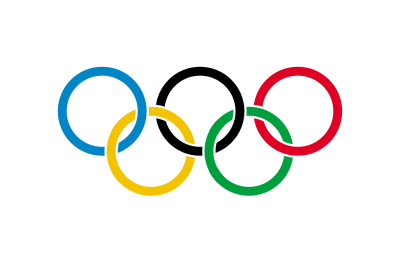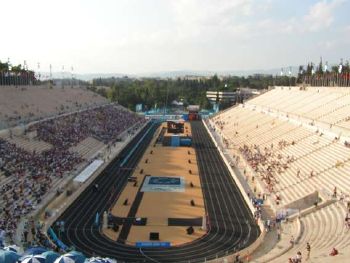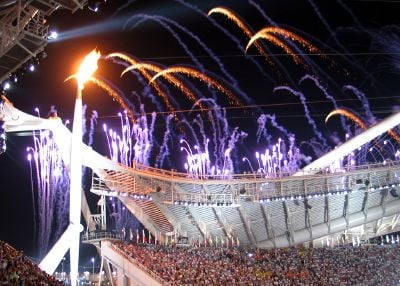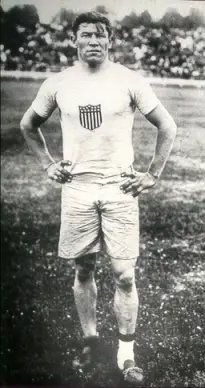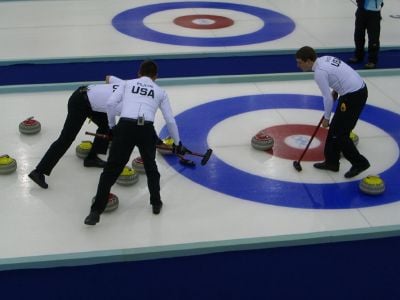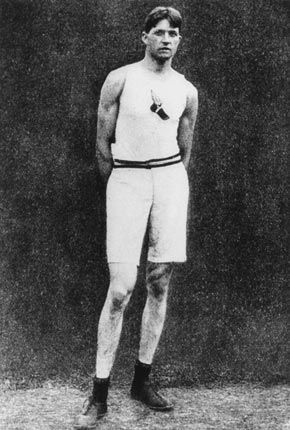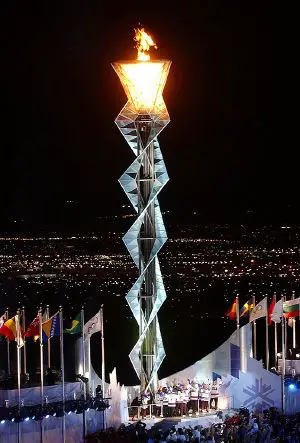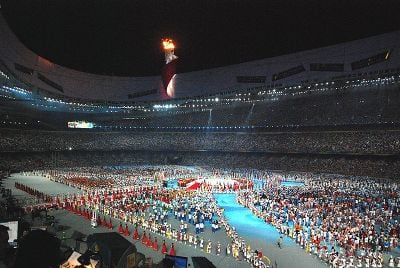What do you know about the olympic games
What do you know about the olympic games
Презентация- викторина «What do you know about the Olympic Games?»
Курс повышения квалификации
Психологические методы развития навыков эффективного общения и чтения на английском языке у младших школьников
Курс повышения квалификации
Профессиональные компетенции педагога в рамках Федерального закона «Об образовании в Российской Федерации» №273-ФЗ от 29.12.2012
Курс повышения квалификации
Современные методы развития навыков эффективного и уверенного общения на английском языке у старших школьников
«Эффективное обучение иностранным языкам дошкольников: занятия с детьми»
Учебные задания в аспекте функциональной грамотности школьников в новом учебном году
Открытая сессия для педагогов и родителей
Описание презентации по отдельным слайдам:
HOW MUCH
DO YOU KNOW ABOUT
THE OLYMPIC GAMES?
What is
painted on the
Olympic flag?
The great mathematician, the creator of the famous theorem, was the Olympic champion in the fist fight.
Who is it?
XXII Olympic games were held in Moscow. In what year?
What modern state is the birthplace
of the Olympic games?
What is
the motto
of the Olympic games?
Citius, Altius, Fortius
(Faster, Higher, Stronger)
Who is the founder of the modern Olympic games?
Pierre de Coubertin
What do the five Olympic rings
The five continents:
Europe, Africa, America, Asia, Australia
What Olympic water sport
is only
for women?
The Olympics was held in honor of which Greek god:
— Athena
— Apollo
— Zeus
Where and when were the first modern Olympic games held?
When was
the Olympic flame
lit for the first time?
The international Olympic Committee
What Olympic sport is played in the pool?
Рабочие листы и материалы для учителей и воспитателей
Более 3 000 дидактических материалов для школьного и домашнего обучения
«Кинетический имидж учителя и его невербальное влияние на учеников»
Свидетельство и скидка на обучение каждому участнику
«Начало учебного года современного учителя»
Свидетельство и скидка на обучение каждому участнику
Дистанционные курсы для педагогов
Видеолекции для
профессионалов
Найдите материал к любому уроку, указав свой предмет (категорию), класс, учебник и тему:
5 895 374 материала в базе
Материал подходит для УМК
«Английский язык. Часть 1», Афанасьева О.В., Михеева И.В., Баранова К.М.
8. Paralympic games
«Нейроигры для детей от 1 до 7»
Свидетельство и скидка на обучение каждому участнику
Другие материалы
Вам будут интересны эти курсы:
Оставьте свой комментарий
Авторизуйтесь, чтобы задавать вопросы.
Настоящий материал опубликован пользователем Павлова Маргарита Владимировна. Инфоурок является информационным посредником и предоставляет пользователям возможность размещать на сайте методические материалы. Всю ответственность за опубликованные материалы, содержащиеся в них сведения, а также за соблюдение авторских прав несут пользователи, загрузившие материал на сайт
Если Вы считаете, что материал нарушает авторские права либо по каким-то другим причинам должен быть удален с сайта, Вы можете оставить жалобу на материал.
Автор материала
Московский институт профессиональной
переподготовки и повышения
квалификации педагогов
Дистанционные курсы
для педагогов
663 курса от 690 рублей
Выбрать курс со скидкой
Выдаём документы
установленного образца!
«Организация профессиональной деятельности социального педагога в условиях реализации ФГОС»
«Обсуждение проблем обучения, воспитания и развития дошкольника и младшего школьника с ОВЗ»
«Как общаться с ребенком, чтобы он дал вам поработать из дома?»
Подарочные сертификаты
Ответственность за разрешение любых спорных моментов, касающихся самих материалов и их содержания, берут на себя пользователи, разместившие материал на сайте. Однако администрация сайта готова оказать всяческую поддержку в решении любых вопросов, связанных с работой и содержанием сайта. Если Вы заметили, что на данном сайте незаконно используются материалы, сообщите об этом администрации сайта через форму обратной связи.
Все материалы, размещенные на сайте, созданы авторами сайта либо размещены пользователями сайта и представлены на сайте исключительно для ознакомления. Авторские права на материалы принадлежат их законным авторам. Частичное или полное копирование материалов сайта без письменного разрешения администрации сайта запрещено! Мнение администрации может не совпадать с точкой зрения авторов.
Сценарий внеклассного мероприятия. Тема: «What do you know about the Olympic Games?»
Тема : «What do you know about the Olympic Games?»
The quiz for the 7-8th form:
— актуализация полученных знаний по темам “ История Олимпийских игр” и «Национальные виды спорта Великобритании и США».
— повторить изученный страноведческий материал об истории олимпийских игр, о национальных видах спорта Великобритании и США.
— научить переносить полученные знания в новую ситуацию общения.
— способствовать развитию памяти и логического мышления.
— способствовать повышению мотивации к изучению иностранного языка.
— воспитывать инициативность и активность учащихся.
— формировать чувство организованности, уважения к сопернику, умения работать в команде.
— компьютер с мультимедийным комплексом,
— презентация POWER POINT с содержанием викторины,
— жетоны для подсчета очков, импровизированные медали победителям.
Правила проведения викторины:
— викторина проводится в 3 раунда,
— в каждом раунде принимают участие две команды учащихся во главе с капитаном,
— на каждый вопрос викторины команды отвечают по очереди,
— если команда затрудняется или дают неверный ответ, ход переходит ко второй команде,
— выигрывает в каждом раунде команда, ответившая правильно на большее количество вопросов и получившая наибольшее количество жетонов.
“What do you know about the Olympic Games?”
1-st round “The History of the Olympic Games”
T: We are going to start the 1-st round. Let’s answer the following questions:
1. When and where did the Olympic Games begin? (776 BC, Ancient Greece)
2. When and where did the first Olympic Games take place? (In Athens)
3. How did they take place? (every 4 years)
4. Why did the Olympic Games become the symbol of peace and friendship? (For the period of games all the wars stopped)
Т : Thanks for your answers. Let’s count our points.
2-nd round “The Olympic movement”
T: Now we are going to start the 2-nd round. Let’s answer the following questions:
1. What is the central policy-making body of the Olympic movement? (The International Olympic Committee)
2. What is necessary besides sports competitions for the Olympic Games? (a cultural program of concerts, exhibitions, festivals)
3. When did Russia join the Olympic movement? (1952)
4. Where and when did Olympic Games take place in our country? (the 22-nd Olympic Games, Moscow, 1980)
Т : Thanks for your answers. It time to count the points of every team and find out the winner in this round.
Let’s start the 3-rd round.
3-rd round “National sports of Great Britain and the USA”
T: Let’s start the 3-rd round. Let’s answer the following questions:
1. Which game is the most popular game in GB and in the world? (Soccer-football)
2. What club is the biggest football club in the world? (“Manchester United”, England) –
3. What kind of sport is Derby connected with? (Horse racing)
4. What kind of sport is Wimbledon connected with? (All-England and International Tennis Championships)
5. What is a “walking” game in Britain? (golf)
6. When and where was basketball invented? (by a teacher at a sports school in Springfield, USA, 1891)
7. What kinds of sports were originated in the USA also? (volleyball, wind-surfing, skate-boarding, triathlon)
T: Thanks for your answers. It time to count the points of every team and find out the winner in this round.
Т : We are coming to the end of our competition. Everybody was active and intelligent. I hope you`ve learnt many interesting facts about the Olympic movement in Russian and in English. This is the end of our sport quiz and we have winners. They are awarded special medals of winners. The game is over. Good luck!
3. Материалы журнала «1 Сентября» № 10 (2005 г.), № 15 2006 г. 4. Материалы журнала «Методическая мозаика» № 5 2006 г.
6. В.П. Кузовлев Английский язык: учебник для 8 класса общеобразоват. учреждений – М. Просвещение, 2011
7. Е.В.Саплина, Б.С.Ляпустин. История древнего мира. М. Дрофа,2007.
Olympic games
The Olympic Games (often referred to simply as The Olympics) are the worlds premier multi-sport international athletic competition held every four years in various locations. Separate summer and winter games are now held two years apart from each other. Until 1992, they were held in the same year.
The original Olympic Games began in c. 776 B.C.E. in Olympia, Greece, and were hosted for nearly a thousand years, until 393 C.E.. The Greek games were one of the splendors of the ancient world, so much so that warring factions took breaks so their athletes could compete. The games gradually lost popular support, however, as the ascendant Roman Empire hosted far bloodier and more spectacular gladiatorial combat, and the later Christianized empire saw the games as recalling pagan festivals.
Greek philanthropist Evangelos Zappas sponsored the first modern international Olympic Games in 1859. The International Olympic Committee (IOC) was founded in 1894, and the first of the IOC’s Olympic Games were the 1896 Summer Olympics, held in Athens. Participation in the Olympic Games has increased to include athletes from nearly all nations worldwide. With the improvement of satellite communications and global telecasts of the events, the Olympics have grown into a global media phenomenon, with cities worldwide vying for the coveted opportunity to host the games.
Contents
When the modern Olympics resumed in 1896, there was hope that such grand-scale athletic competition could be a force for peace. Competitive sports showcase human excellence, self mastery, and cooperative teamwork. Sports are played in remote villages and great cities on every continent and provide a bridge across religious, social, and ethnic divides. For a time the Olympic dream lasted, yet as world war twice engulfed nations in the twentieth century, and the Cold War divided peoples and states, the Olympics succumbed to nationalistic triumphalism, cheating scandals, and crass commercialism. The Olympics continue to engender pride in human accomplishment and respect for political adversaries, yet the promise of the Olympics to rise above about political divisions and exemplify human ideals remains to be realized.
Ancient Olympics
According to legend, the divine hero Heracles was the creator of the Olympic Games and built the Olympic stadium and surrounding buildings as an honor to his father Zeus, after completing his 12 labors. According to that legend he walked in a straight line for 400 strides and called this distance a «stadion» (Greek: «Στάδιον»), which later also became a distance calculation unit. This is also why a modern stadium is 400 meters in circumference length. Another myth associates the first Games with the ancient Greek concept of ἐκεχειρία (ekecheiria) or Olympic Truce, in which a solemn truce was enacted between warring city-states to allow athletes to compete in the Games. The date of the Games’ is often reconstructed as 776 B.C.E., although scholarly opinion ranges between dates as early as 884 B.C.E. and as late as 704 B.C.E.
The Games quickly became an important institution throughout ancient Greece, reaching their zenith in the sixth and fifth centuries B.C.E.. The Olympics were of fundamental religious importance, contests alternating with sacrifices and ceremonies honoring both Zeus (whose colossal statue stood at Olympia), and Pelops, divine hero and mythical king of Olympia, famous for his legendary chariot race, in whose honor the games were held.
At first involving only a foot race, then wrestling and the pentathlon, the number of events increased to 20, and the celebration was spread over several days. Winners of the events were greatly admired and were immortalized in poems and statues. The Games were held every four years, and the period between two celebrations became known as an ‘Olympiad’. The Greeks used Olympiads as one of their methods to count years. The most famous Olympic athlete lived in the sixth century B.C.E., wrestler Milo of Croton, the only athlete in history to win a victory in six Olympics.
The Games gradually declined in importance as the Romans gained power in Greece. When Christianity became the official religion of the Roman Empire, the Olympic Games were seen as a pagan festival in discord with Christian ethics, and in 393 C.E. the emperor Theodosius I outlawed the Olympics, ending a thousand-year tradition.
During ancient times normally only young men could participate. Competitors were usually naked, as the festival was meant to be, in part, a celebration of the achievements of the human body. Upon winning the games, the victor would not only have the prestige of being in first place but would also be presented with a crown of olive leaves.
Even though the bearing of a torch formed an integral aspect of many Greek ceremonies, the ancient Olympic Games did not include it, nor was there a symbol formed by interconnecting rings. These Olympic symbols were introduced as part of the modern Olympic Games.
Revival
In the early seventeenth century, an «Olympick Games» sports festival was run for several years at Chipping Campden in the English Cotswolds, and the present day local Cotswold Games trace their origin to this festival. In 1850, an «Olympian Class» was begun at Much Wenlock in Shropshire, England. This was renamed «Wenlock Olympian Games» in 1859 and continues to this day as the Wenlock Olympian Society Annual Games. A national Olympic Games was organized by their founder, Dr William Penny Brookes, at Crystal Palace in London, in 1866.
Meanwhile, a wealthy Greek [[philanthropy|philanthropist], Evangelos Zappas, sponsored the revival of the first modern international Olympic Games. The first of these were held in an Athens city square in 1859. Zappas paid for the refurbishment of the ancient Panathenian stadium, which was first used for an Olympic Games in 1870 and then again in 1875. The revival included athletes from two countries, representing very different cultures: Greece and the Ottoman Empire.
The interest in reviving the Olympics as an international event grew further when the ruins of ancient Olympia were uncovered by German archaeologists in the mid-nineteenth century. Baron Pierre de Coubertin founded the International Olympic Committee, and at a congress at the Sorbonne University, in Paris, held from June 16 to June 23, 1894, it was decided that the first IOC Olympic Games would take place in 1896 in Athens, in the country of their birth. To organize the Games, Demetrius Vikelas was named as the IOC’s first president. The Panathenian stadium that was used for Olympic Games in 1870, and 1875 was refurbished and used again for the Olympic Games held in Athens in 1896.
The total number of athletes at the first IOC Olympic Games, less than 250, seems small by modern standards, but the games were the largest international sports event ever held until that time. Greek officials and the public were very enthusiastic and proposed to have the monopoly over organizing the Olympics. The IOC decided differently, however, and the second Olympic Games took place in Paris. This was also the first Olympic Games where women were allowed to compete.
Modern Olympics
After the initial success, the Olympics struggled. The celebrations in Paris (1900) and St. Louis (1904) were overshadowed by the World’s Fair exhibitions in which they were included. The 1906 Intercalated Games (so called because of their off-year status) were held in Athens. Although originally the IOC recognized and supported these games, they are currently not recognized by the IOC as official Olympic Games. The 1906 Games, however, again attracted a broad international field of participants—in 1904 at St. Louis, 80 percent had been American—and of great public interest, thereby marking the beginning of a rise in popularity and size of the Games.
From the 241 participants from 14 nations in 1896, the Games grew to more than 11,000 competitors from 202 countries at the 2004 Summer Olympics, again held in Athens. The number of competitors at the Winter Olympics is much smaller than at the Summer Games; at the 2006 Winter Olympics in Turin Italy, 2,633 athletes from 80 countries competed in 84 events.
The Olympics are one of the world’s largest media events. In Sydney in 2000 there were over 16,000 broadcasters and journalists, and an estimated 3.8 billion viewers watched the games on television. The growth of the Olympics is one of the largest problems the Olympics face today. Although allowing professional athletes and attracting sponsorships from major international companies solved financial problems in the 1980s, the large number of athletes, media and spectators makes it difficult and expensive for host cities to organize the Olympics.
At last count, 203 nations participated in the Olympics. This is a noticeably higher number than the number of countries recognized by the United Nations, which is only 193. This is because the IOC allows colonies and dependencies to sponsor their own Olympic teams and athletes even if such competitors hold the same citizenship as another member nation.
Amateurism and professionalism
The English public schools of the second half of the nineteenth century had a major influence on many sports. They subscribed to the Ancient Greek and Roman belief that sport formed an important part of education.
Initially, professional athletes were not allowed to compete in the Olympic Games. A short-lived exception was made for professional fencing instructors. This exclusion of professionals has caused several controversies throughout the history of the modern Olympics. The 1912 Olympic pentathlon and decathlon champion, Jim Thorpe, was disqualified when it was discovered that he played semi-professional baseball prior to winning his medals. He was restored as a champion on compassionate grounds by the IOC in 1983. Swiss and Austrian skiers boycotted the 1936 Winter Olympics in support of their skiing teachers, who were not allowed to compete because they earned money with their sport and were considered professionals.
It gradually became clear to many that the amateurism rules had become outdated, not least because the self-financed amateurs of Western countries often were no match for the state-sponsored «full-time amateurs» of Eastern-bloc countries. In addition, many of the world’s best athletes could not participate in important spectator sports, reducing the popularity of some Olympic contests.
In the 1970s, amateurism requirements were dropped from the Olympic Charter, leaving decisions on professional participation to the international federation for each sport. As of 2004, the only sport in which no professionals compete is boxing; and in men’s football (soccer), the number of players over 23 years-of-age is limited to three per team.
Olympic sports
Currently, the Olympic program consists of 35 different sports, 53 disciplines, and more than 400 events. The Summer Olympics includes 28 sports with 38 disciplines and the Winter Olympics includes seven sports with 15 disciplines.
Nine sports were on the original modern Olympic program in 1896: athletics, cycling, fencing, gymnastics, weightlifting, shooting, swimming, tennis, and wrestling. rowing events were scheduled as well, but had to be canceled due to bad weather.
Cross country skiing, figure skating, ice hockey, Nordic combined, ski jumping, and speed skating have been featured on the program at all Winter Olympics. Figure skating and ice hockey also had been contested as part of the Summer Games before the introduction of separate Winter Olympics.
In recent years, the IOC has added several new sports to the program to attract attention from young spectators. Examples of such sports include snowboarding and beach volleyball. The growth of the Olympics also means that some less popular (modern pentathlon) or expensive (white water canoeing) sports may lose their place on the Olympic program. The IOC decided to discontinue baseball and softball beginning in 2012.
Rule 48.1 of the Olympic Charter requires that there be a minimum of 15 Olympic sports at each Summer Games. However, each sport may have many «events,» such as competitions in various weight classes, styles (as in swimming styles), men’s and women’s events, etc. Following the 2002 Games, the IOC decided to limit the program of the Summer Games to a maximum of 28 sports, 301 events, and 10,500 athletes.
The Olympic sports are defined as those governed by the International Federations listed in Rule 46 of the Olympic Charter. A two-thirds vote of the IOC is required to amend the Charter to promote a Recognized Federation to Olympic status and therefore make the sports it governs eligible for inclusion on the Olympic program. Rule 47 of the Charter requires that only Olympic sports may be included in the program.
The IOC reviews the Olympic program at the first Session following each Olympiad. A simple majority is required for an Olympic sport to be included in the Olympic program. Under the current rules, an Olympic sport not selected for inclusion in a particular Games remains an Olympic sport and may be included again later with a simple majority. The IOC has slated 26 sports to be included in the program for London 2012.
Until 1992, the Olympics also often featured demonstration sports. The objective was for these sports to reach a larger audience; the winners of these events are not official Olympic champions. These sports were sometimes sports popular only in the host nation, but internationally known sports have also been demonstrated. Some demonstration sports eventually were included as full-medal events.
Olympic champions and medalists
The athletes (or teams) who place first, second, or third in each event receive medals. The winners receive «gold medals.» (Though they were solid gold until 1912, they are now made of gilded silver.) The runners-up receive silver medals, and the third-place athletes receive bronze medals. In some events contested by a single-elimination tournament (most notably boxing), a third place might not be determined, in which case both semi-final losers receive bronze medals. The practice of awarding medals to the top three competitors was introduced in 1904; at the 1896 Olympics only the first two received a medal, silver and bronze, while various prizes were awarded in 1900. In addition, from 1948 onward athletes placing fourth, fifth and sixth have received certificates which became officially known as «victory diplomas;» since 1976 the medal winners have received these also, and in 1984 victory diplomas for seventh- and eighth-place finishers were added. At the 2004 Summer Olympics in Athens, the first three were given wreaths as well as their medals.
Athletes and the public often consider Olympic medals as more valuable than world championships and medals from other international tournaments. Many athletes have become heroes in their own country after becoming Olympic champions.
The IOC ranks countries according to a medal tally chart based on the number of gold medals awarded to each country. Where states have equal numbers of gold medals, the number of silver medals, and then bronze medals, are counted to determine rankings.
Olympic Movement
A number of organizations are involved in organizing the Olympic Games. Together they form the Olympic Movement. The rules and guidelines by which these organizations operate are outlined in the Olympic Charter.
At the heart of the Olympic Movement is the International Olympic Committee (IOC). It can be seen as the government of the Olympics, as it takes care of the daily problems and makes all important decisions, such as choosing the host city of the Games, and the program of the Olympics.
Three groups of organizations operate on a more specialized level:
At present, 202 NOCs and 35 IFs are part of the Olympic Movement. OCOGs are dissolved after the celebration of each Games, once all subsequent paperwork has been completed.
More broadly speaking, the term Olympic Movement is sometimes also meant to include everybody and everything involved in the Olympics, such as national sport governing bodies, athletes, media, and sponsors of the Olympic Games.
Olympic symbols
The Olympic movement uses many symbols, most of them representing IOC founder Coubertin’s ideals. The best-known symbol is the Olympic Rings. These five intertwined rings represent the unity of five inhabited continents (with America regarded as one single continent). They appear in five colors on a white field on the Olympic Flag. These colors, white (for the field), red, blue, green, yellow, and black were chosen such that each nation had at least one of these colors in its national flag. The flag was adopted in 1914, but the first Games at which it was flown was the Antwerp, 1920. It is hoisted at each celebration of the Games.
The official Olympic Motto is «Citius, Altius, Fortius,» a Latin phrase meaning «Swifter, Higher, Stronger.» Coubertin’s ideals are probably best illustrated by the Olympic Creed:
The most important thing in the Olympic Games is not to win but to take part, just as the most important thing in life is not the triumph but the struggle. The essential thing is not to have conquered but to have fought well.
The Olympic Flame is lit in Olympia, Greece and brought to the host city by runners carrying the torch in relay. There it plays an important role in the opening ceremonies. The torch fire has been featured since 1928, but the relay was not introduced until 1936.
The Olympic mascot, an animal or human figure representing the cultural heritage of the host country, was introduced in 1968. It has played an important part of the games since 1980 with the debut of misha, a Russian bear.
French and English are the two official languages of the Olympic Movement.
Olympic ceremonies
Opening
Apart from the traditional elements, the host nation ordinarily presents artistic displays of dance and theater representative of that country. Various traditional elements frame the opening ceremonies of a celebration of the Olympic Games. The ceremonies typically start with the hoisting of the host country’s flag and the performing of its national anthem. The traditional part of the ceremonies starts with a «parade of nations» (or of athletes), during which most participating athletes march into the stadium, country by country. One honored athlete, typically a top competitor, from each country carries the flag of his or her nation, leading the entourage of other athletes from that country.
Greece normally marches first, because of its historical status as the origin of the Olympics, while the host nation marches last. All other participating nations march in alphabetical order based on the dominant language of the host country, or in French or English alphabetical order if the host country does not write its dominant language in an alphabet with a set order. For example, in the XVIII Olympic Winter Games in Nagano, Japan, nations entered in English alphabetical.
After all nations have entered, the president of the host country’s Olympic Organizing Committee makes a speech, followed by the IOC president who, at the end of his speech introduces the person who is going to declare the Games open. Despite the Games having been awarded to a particular city and not to the country in general, the opener is usually the host country’s Head of State.
Next, the Olympic flag is carried horizontally (since the 1960 Summer Olympics) into the stadium and hoisted as the Olympic Anthem is played. The flag bearers of all countries circle a rostrum, where one athlete and one judge speak the Olympic Oath, declaring they will compete and judge according to the rules. Finally, the Olympic Torch is brought into the stadium, passed from athlete to athlete, until it reaches the last carrier of the Torch, often a well-known athlete from the host nation, who lights the fire in the stadium’s cauldron. The Olympic Flame has been lit since the 1928 Summer Olympics, but the torch relay did not start until the 1936 Summer Olympics. Beginning at the post-World War I 1920 Summer Olympics, the lighting of the Olympic Flame was for 68 years followed by the release of doves, symbolizing peace. This gesture was discontinued after several doves were burned alive in the Olympic Flame during the opening ceremony of the 1988 Summer Olympics.
Closing ceremonies
Various traditional elements also frame the closing ceremonies of an Olympic Games, which take place after all of the events have concluded. Flag bearers from each participating delegation enter the stadium in single file, but behind them march all of the athletes without any distinction or grouping of nationality. This tradition began at the 1956 Summer Olympics at the suggestion of Melbourne schoolboy John Ian Wing, who thought it would be a way of bringing the athletes of the world together as «one nation.» (In 2006, the athletes marched in with their countrymen, then dispersed and mingled as the ceremonies went on).
Three national flags are each hoisted onto flagpoles one at a time while their respective national anthems are played: The flag of Greece on the right-hand pole (again honoring the birthplace of the Olympic Games), the flag of the host country on the middle pole, and finally the flag of the host country of the next Summer or Winter Olympic Games, on the left-hand pole. (Exceptionally, in 2004, when the Games were held in Athens, only one flag of Greece was raised.)
In what is known as the «Antwerp Ceremony» (because the tradition started during the 1920 Summer Olympics in Antwerp), the mayor of the city that organized the Games transfers a special Olympic Flag to the president of the IOC, who then passes it on to the mayor of the next city to host the Olympic Games. The receiving mayor then waves the flag eight times. There are three such flags, differing from all other copies in that they have a six-colored fringe around the flag, and are tied with six colored ribbons to a flagstaff:
After these traditional elements, the next host nation introduces itself with artistic displays of dance and theater representative of that country. This tradition began with the 1976 Games.
The president of the host country’s Olympic Organizing Committee makes a speech, followed by the IOC president, who at the end of his speech formally closes the Olympics, by saying:
The Olympic Flame is extinguished, and while the Olympic anthem is being played, the Olympic Flag that was hoisted during the opening ceremonies is lowered from the flagpole and horizontally carried out of the stadium.
References
External links
All links retrieved July 24, 2021.
Credits
New World Encyclopedia writers and editors rewrote and completed the Wikipedia article in accordance with New World Encyclopedia standards. This article abides by terms of the Creative Commons CC-by-sa 3.0 License (CC-by-sa), which may be used and disseminated with proper attribution. Credit is due under the terms of this license that can reference both the New World Encyclopedia contributors and the selfless volunteer contributors of the Wikimedia Foundation. To cite this article click here for a list of acceptable citing formats.The history of earlier contributions by wikipedians is accessible to researchers here:
The history of this article since it was imported to New World Encyclopedia:
Note: Some restrictions may apply to use of individual images which are separately licensed.
Внеклассное мероприятие «WHAT DO YOU KNOW ABOUT THE OLYMPIC GAMES? »
Внеклассное мероприятие «WHAT DO YOU KNOW ABOUT THE OLYMPIC GAMES? »
— актуализация полученных знаний по темам “ История Олимпийских игр” и «Национальные виды спорта Великобритании и США».
— повторить изученный страноведческий материал об истории олимпийских игр, о национальных видах спорта Великобритании и США.
— научить переносить полученные знания в новую ситуацию общения.
— способствовать развитию памяти и логического мышления.
— способствовать повышению мотивации к изучению иностранного языка.
— воспитывать инициативность и активность учащихся.
— формировать чувство организованности, уважения к сопернику, умения работать в команде.
-презентация POWER POINT с содержанием викторины,
-жетоны для подсчета очков, импровизированные медали победителям.
Правила проведения викторины:
-викторина проводится в 3 раунда,
-в каждом раунде принимают участие две команды учащихся во главе с капитаном,
-на каждый вопрос викторины команды отвечают по очереди,
-если команда затрудняется или дают неверный ответ, ход переходит ко второй команде,
-выигрывает в каждом раунде команда, ответившая правильно на большее количество вопросов и получившая наибольшее количество жетонов.
Т : Good afternoon students! I am glad to see you! I think you all are fond of sport: watching sport competitions on TV or practicing different kinds of sport. Some kinds of sport appeared recently and others in ancient times. And from ancient times sport competitions helps people to have a healthy mind in a healthy body. “As in daytime there is no star in the sky warmer and brighter than the sun likewise there is no competition greater than the Olympic Games” wrote a Greek poet in the 5th century BC. So, today we are going to have a lesson devoted to history of Olympic Games. It is a sports quiz consisting of 3 rounds. The topics of them are: “The History of ancient Olympic Games”, “The Olympic movement” and “National sports of Great Britain and the USA”. Every round will have its winners. Be attentive and polite, please. Before we start the quiz let’s present our teams. Good luck!
II. Основной этап. Проведение викторины.
The quiz for the 8th form:
“What do you know about the Olympic Games?”
1-st round “The History of the Olympic Games”
T: We are going to start the 1-st round. Let’s answer the following questions:
1. When and where did the Olympic Games begin? (776 BC, Ancient Greece)
2. When and where did the first Olympic Games take place? (In Athens)
3. How did they take place? (every 4 years)
4. Why did the Olympic Games become the symbol of peace and friendship? (For the period of games all the wars stopped)
Т : Thanks for your answers. Let’s count our points.
2-nd round “The Olympic movement”
T: Now we are going to start the 2-nd round. Let’s answer the following questions:
1. What is the central policy-making body of the Olympic movement? (The International Olympic Committee)
2. What is necessary besides sports competitions for the Olympic Games? (a cultural program of concerts, exhibitions, festivals)
3. When did Russia join the Olympic movement? (1952)
4. Where and when did Olympic Games take place in our country? (the 22-nd Olympic Games, Moscow, 1980)
Т : Thanks for your answers. It time to count the points of every team and find out the winner in this round.
Let’s start the 3-rd round.
3-rd round “National sports of Great Britain and the USA”
T: Let’s start the 3-rd round. Let’s answer the following questions:
1. Which game is the most popular game in GB and in the world? (Soccer-football) –
2. What club is the biggest football club in the world? (“Manchester United”, England)
3. What kind of sport is Derby connected with? (Horse racing)
4. What kind of sport is Wimbledon connected with? (All-England and International Tennis Championships)
5. What is a “walking” game in Britain? (golf)
6. When and where was basketball invented? (by a teacher at a sports school in Springfield, USA, 1891)
7. What kinds of sports were originated in the USA also? (volleyball, wind-surfing, skate-boarding, triathlon)
T: Thanks for your answers. It time to count the points of every team and find out the winner in this round.
III. Подведение итогов викторины. Награждение команды победителя.
Т : We are coming to the end of our competition. Everybody was active and intelligent. I hope you`ve learnt many interesting facts about the Olympic movement in Russian and in English. This is the end of our sport quiz and we have winners. They are awarded special medals of winners. The game is over. Good luck!
«WHAT DO YOU KNOW ABOUT THE OLYMPIC GAMES? » Внеклассное мероприятие по английскому языку в 8 классах( с презентацией)
Курс повышения квалификации
Геймификация как универсальная технология развития внутренней учебной мотивации школьников
Курс повышения квалификации
Педагогические основы деятельности учителя общеобразовательного учреждения в условиях ФГОС
Курс профессиональной переподготовки
Английский язык: теория и методика преподавания в дошкольном образовании
«Домашнее обучение. Лайфхаки для родителей»
Учебные задания в аспекте функциональной грамотности школьников в новом учебном году
Открытая сессия для педагогов и родителей
Описание презентации по отдельным слайдам:
The quiz for the 8th form: “What do you know about
the Olympic Games?”
1.When were the Olympics born? (name the date and the country)
776 BC, Ancient Greece
For example: winter Olympic games took place in
1912-1916-1920-1924-1928-1932-1936- 1948-1952-1956-1960-1964-1968-1972-1926-1980-1984-1988-1992-1996-2000-2004-2008-2012.
2. How often are they held?
every 4 years
3. Why have Olympic Games become a symbol of peace and friendship?
all wars stopped during the Games
4. When and where were the first modern Olympic Games held? (name the town and the year)
In Athens, 1896
5. What is the Olympic motto?
Faster, higher, stronger
6. When did Russia join the Olympic movement?
In 1952
7. When did Russia take part in winter Olympic Games for the first time?
9. Who was the first Russian Olympic champion in winter games?
Lubov Baranova, skiing
10. Here are the names of Olympic champions from our country. Name the sport:
Karelin
Kanaeva
Tikhonov
Skoblikova
Sotnikova
11. What was the slogan of OG in Sochi?
Hot. Cool. Yours
12. What was the talismans of the Olympics in Sochi?
13.How many medals did our sportsmen win in Sochi?
33. 13-gold. 11-silver. 9- bronze
14. At what time did the opening ceremony in Sochi begin?
20.14, the 7th of February
15.Who carried the flag of the Russian Federation in the opening ceremony in Sochi?
Alexandr Zubkov
16. Who sang the national anthem of Russia in the opening ceremony in Sochi?
17.Who started the Olympic Fire in Sochi?
V. Tretiak, I. Rodnina
18. How many countries took part in the Olympics in Sochi?
83
19. What countries played in the final (hockey)? Who won and what was the score?
Canada- Sweden. 3-0
20. Which country will be the host for the next winter Olympic Games?
Korea
The game is over.
Good luck!
Источники:
http://900igr.net/kartinki/fizkultura/Istorija-olimpijskikh-igr/Istorija-olimpijskikh-igr.html
http://900igr.net/kartinki/fizkultura/Olimpijskie-igry.html
http://net.eurekanet.ru/prog/luceum/antich/bogi/olimp.htm
http://ru.wikipedia.org/wiki/Олимпийские игры
http://olimp-cdt.narod.ru/istoria.html
http://www.bbc.com/sport/0/horse-racing/25536997
http://ldpr.org/wp-content/uploads/2014/02/олимпиада-зима.png
Краткое описание документа:
— актуализация полученных знаний по темам “ История Олимпийских игр” и «Национальные виды спорта Великобритании, США и России».
— повторить изученный страноведческий материал об истории олимпийских игр, о национальных видах спорта Великобритании, США и России.
— научить переносить полученные знания в новую ситуацию общения.
— способствовать развитию памяти и логического мышления.
— способствовать повышению мотивации к изучению иностранного языка.
— воспитывать инициативность и активность учащихся.
— формировать чувство организованности, уважения к сопернику, умения работать в команде.
-презентация POWER POINT с содержанием викторины,
-жетоны для подсчета очков, импровизированные медали победителям.
Правила проведения викторины:
-викторина проводится в 3 раунда,
-в каждом раунде принимают участие две команды учащихся во главе с капитаном,
-на каждый вопрос викторины команды отвечают по очереди,
-если команда затрудняется или дает неверный ответ, ход переходит ко второй команде,
-выигрывает в каждом раунде команда, ответившая правильно на большее количество вопросов и получившая наибольшее количество жетонов.
Т : Good afternoon students! I am glad to see you! I think you all are fond of sport. Some kinds of sport appeared recently and others in ancient times. So, today we are going to have a lesson devoted to history of Olympic Games. It is a sports quiz consisting of 3 rounds. The topics of them are: “The History of ancient Olympic Games”, “The Olympic movement” and “National sports of Great Britain, the USA and Russia”. Every round will have its winners. Be attentive and polite, please. Before we start the quiz let’s present our teams. Good luck!
II. Основной этап. Проведение викторины.
The quiz for the 8th form:
“What do you know about the Olympic Games?”- слайд 1
1-st round “The History of the Olympic Games”- слайд 2
T: We are going to start the 1-st round. Let’s answer the following questions:
1. When and where did the Olympic Games begin? (776 BC, Ancient Greece) – слайд 3
2. When and where did the first Olympic Games take place? (In Athens) – слайд 4
3. How did they take place? (every 4 years) – слайд 5
4. Why did the Olympic Games become the symbol of peace and friendship? (For the period of games all the wars stopped) – слайд 6
Т : Thanks for your answers. Let’s count our points.
2-nd round “The Olympic movement”- слайд 7
T: Now we are going to start the 2-nd round. Let’s answer the following questions:
2. What is necessary besides sports competitions for the Olympic Games? (a cultural program of concerts, exhibitions, festivals) – слайд 9
3. When did Russia join the Olympic movement? (1952) – слайд 10
4. Where and when did Olympic Games take place in our country? (the 22-nd Olympic Games, Moscow, 1980, Sochi, 2014) – слайд 11
Т : Thanks for your answers. It time to count the points of every team and find out the winner in this round.
Let’s start the 3-rd round.
3-rd round “National sports of Great Britain and the USA”- слайд 13
T: Let’s start the 3-rd round. Let’s answer the following questions:
1. Which game is the most popular game in GB and in the world? (Soccer-football) – слайд 14
2. What club is the biggest football club in the world? (“Manchester United”, England) – слайд 15
3. What kind of sport is Derby connected with? (Horse racing) – слайд 16
4. What kind of sport is Wimbledon connected with? (All-England and International Tennis Championships) – слайд 17
5. What is a “walking” game in Britain? (golf) – слайд 18
7. What kinds of sports were originated in the USA also? (volleyball, wind-surfing, skate-boarding, triathlon) – слайд 20
T: Thanks for your answers. It time to count the points of every team and find out the winner in this round.
III. Подведение итогов викторины. Награждение команды победителя.
Рабочие листы и материалы для учителей и воспитателей
Более 3 000 дидактических материалов для школьного и домашнего обучения
«Кинетический имидж учителя и его невербальное влияние на учеников»
Свидетельство и скидка на обучение каждому участнику
«Начало учебного года современного учителя»
Свидетельство и скидка на обучение каждому участнику
Источники информации:
- http://infourok.ru/scenariy-vneklassnogo-meropriyatiya-tema-at-do-you-kno-about-te-olympic-games-3423209.html
- http://www.newworldencyclopedia.org/entry/Olympic_games
- http://infourok.ru/vneklassnoe_meropriyatie_what_do_you_know_about_the_olympic_games_-560214.htm
- http://infourok.ru/what_do_you_know_about_the_olympic_games__vneklassnoe_meropriyatie_po_angliyskomu_yazyku___v_8-562354.htm






